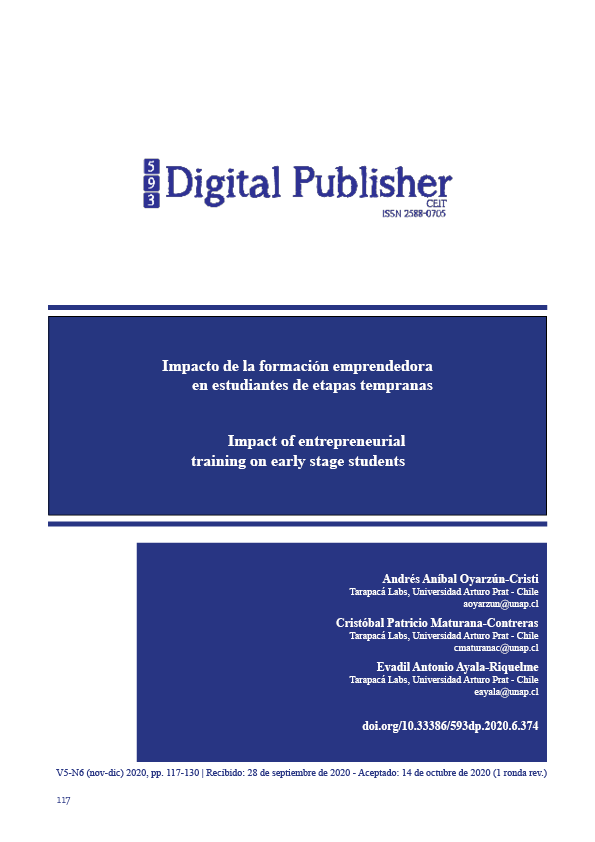Impact of entrepreneurial training on early stage students
Main Article Content
Abstract
In order to improve Chile's regional and national competitiveness, a program to strengthen school entrepreneurship was created in 2018 in the Tarapacá region, extreme north of Chile, called Tarapacá Labs School. Through the program planned in seven sessions, we worked from the inspiration of the students to undertake until the generation of a prototype and the defense of it through a pitch. In the present study, the results of a school tournament developed during 2019 where three educational establishments participated simultaneously with a sample of 77 students are analyzed, with the aim of verifying progress in one or more entrepreneurial aspects of the participants. Based on a statistical investigation of the results of the measurement of the self-evaluation of Personal Entrepreneurial Characteristics (CEP's), it is evident that the sample group tends to equate the evaluations obtained from their entrepreneurial characteristics, but that when analyzing separately those who worked in a special session, relevant variations are evident. It is suggested that thanks to the personalized work in each of them it is possible to enhance or attenuate some characteristics.
Downloads
Article Details

This work is licensed under a Creative Commons Attribution-NonCommercial-ShareAlike 4.0 International License.
1. Derechos de autor
Las obras que se publican en 593 Digital Publisher CEIT están sujetas a los siguientes términos:
1.1. 593 Digital Publisher CEIT, conserva los derechos patrimoniales (copyright) de las obras publicadas, favorece y permite la reutilización de las mismas bajo la licencia Licencia Creative Commons 4.0 de Reconocimiento-NoComercial-CompartirIgual 4.0, por lo cual se pueden copiar, usar, difundir, transmitir y exponer públicamente, siempre que:
1.1.a. Se cite la autoría y fuente original de su publicación (revista, editorial, URL).
1.1.b. No se usen para fines comerciales u onerosos.
1.1.c. Se mencione la existencia y especificaciones de esta licencia de uso.
References
Acuña S., C. (2014). Aplicación de la metodología CEFE como herramienta para el desarrollo de las capacidades empresariales personales a los estudiantes de la Facultad de Ciencias Empresariales de la UPeU-filial Tarapoto. Valor Agregado, 1(1).
Araya, S. C. & Avilés, N. B. (2020). “Enseñar a emprender en universidades de la Región de Coquimbo, Chile: Perfil docente y prácticas de enseñanza”. Revista Actualidades Investigativas en Educación, 20 (1), 1-26. Doi.10.15517/aie.v20i1.39817
Barba B., D. (2013). “Características Emprendedoras Personales (CEP) De hombres y mujeres gerentes de las Cooperativas de Ahorro y Crédito de Riobamba: investigación 2010-2011”. Ciencia Unemi, 6(9), 62-68. DOI: https://doi.org/10.29076/issn.2528- 7737vol6iss9.2013pp62-68p
Bargsted, M., Picón, M., Salazar, A. & Rojas, Y. (2013). “Journal of Social Entrepreneurship (2013): Psychosocial Characterization of Social Entrepreneurs: A Comparative Study”. Journal of Social Entrepreneurship, DOI: https://dx.doi.org/10.1080/19420676.2013.820780.
Clark, D., Pineda, E., Juárez, Y. (2002) “Investigación cuantitativa en psicología : del diseño experimental al reporte de investigación”. Editorial México, Df. Oxford University Press.
Cornell University, INSEAD & WIPO. (2019). “Global Innovation Index”. [Fecha de Consulta 28 de Enero de 2020]. Disponible en: https://www.wipo.int/edocs/pubdocs/en/wipo_pub_gii_2019/cl.pdf
Damián, J. (2013). Sistematizando experiencias sobre educación en emprendimiento en escuelas de nivel primaria. Revista mexicana de investigación educativa, 18(56), 159- 190. ISSN: 1405-6666.
Díaz, C.; Sáez, F. & Jiménez, J. (2015). “Evaluación del impacto del programa educativo “Emprendedores” en la intención emprendedora de los participantes”. RUSC. Universities and Knowledge Society Journal, vol. 12, núm. 3, julio, 2015, pp. 17-31. [Fecha de Consulta 17 de Febrero de 2020]. Disponible en: https://www.redalyc.org/pdf/780/78038521002.pdf
Fernández, C., & de la Rivaa, B. (2014). Entrepreneurial mentality and culture of entrepreneurship (Mentalidad emprendedora y cultura del emprendimiento). Procedia- Social and Behavioral Sciences, 139, 137-143. Doi: 10.1016/j.sbspro.2014.08.044
Fernández, J., & Liñán, F.. (2014). Culture and Entrepreneurship: The Case of Latin America. Innovar, 24(spe), 169-180. DOI: https://dx.doi.org/10.15446/innovar.v24n1spe.47616
García, V. D. (2015) “Emprendimiento Empresarial Juvenil: Una evaluación con jóvenes estudiantes de universidad”. Revista Latinoamericana de Ciencias Sociales, Niñez y Juventud, vol. 13, núm. 2, julio-diciembre, 2015, pp. 1221-1236. [Fecha de Consulta 17 de Febrero de 2020]. ISSN: 1692-715X. Disponible en: https://www.redalyc.org/pdf/773/77340728046.pdf
García, J. C. S., & Sánchez, B. H. (2016). Influencia del Programa Emprendedor Universitario (PREU) para la mejora de la actitud emprendedora. Pampa: Revista Interuniversitaria de Estudios Territoriales, (13), 55-76.
Gómez N., Liyis; Llanos M., M.; Hernández R., T.; Mejía R., D.; Heilbron L., J.; Martín G., J.; Mendoza S., J.; Senior R., D. (2017). “Competencias emprendedoras en Básica Primaria: Hacia una educación para el emprendimiento”. Pensamiento & Gestión, núm. 43, julio-diciembre, 2017, pp. 150-188. [Fecha de Consulta 17 de Febrero de 2020]. Disponible en: http://dx.doi.org/10.14482/pege.41.9704
González, J. L. & Barzola, J. M. (2018): “El coworking como herramienta innovadora para el desarrollo de los nuevos emprendedores”, Revista Observatorio de la Economía Latinoamericana, (marzo 2018). [Fecha de Consulta 17 de Febrero de 2020]. ISSN: 1696-8352. Disponible en: https://www.eumed.net/2/rev/oel/2018/03/coworking- nuevos-emprendedores.html
Guerrero, M., & Serey, T. (2018). “Reporte nacional de Chile 2018. Global Entrepreneurship Monitor (GEM)”, Universidad del Desarrollo. Santiago de Chile. ISBN: 978-956-374- 032-5
Henríquez, G., Rada, J., & Torrenegra, A. (2016). “Medición de variables psicológicas, económicas y sociales para identificar factores ocultos de los emprendedores en Barranquilla”. Económicas CUC, 37(1), 179-202. DOI: http://dx.doi.org/10.17981/econcuc.15.5.2016.08
Hernández, R., Fernández, R., & Baptista, P. (2014). “Selección de la muestra. En metodología de la investigación”. México: McGraw-Hill. Sexta edición. Pág. 178-183.
Krauss, C. (2011). Actitudes emprendedoras de los estudiantes universitarios: El caso de la Universidad Católica del Uruguay. Dimensión empresarial, 9(1), 28-40.
Núñez, M. A. (2017). “Autoestima y habilidades emprendedoras en estudiantes de nivel medio superior”. Revista Electrónica de Psicología Iztacala, 18(1).
Osorio, F. & Londoño, J. (2015). “Intención emprendedora de estudiantes de educación media: extendiendo la teoría de comportamiento planificado mediante el efecto exposición”. Cuadernos de administración, vol. 28, núm. 51, julio-diciembre, 2015, pp.103-131. [Fecha de Consulta 18 de Febrero de 2020]. Disponible en: https://www.redalyc.org/pdf/205/20543851004.pdf
Patton, W.,& McMahon, M. (2006). “Career Development and Systems Theory. Connecting Theory and Practice”. Rotterdam: SensePublishers
Reyes, J. L.; Garzón, M. A. & Tapia, B. (2018) Design and validation of a likerttype scale to establish entrepreneurial characteristics. Dimensión Empresarial, 16(2), 135-160. DOI: http://dx.doi.org/10.15665/dem.v16i2.1599
Rico, A., & Santamaría, M. (2018). Caracterización de la cátedra de emprendimiento en colegios distritales de Bogotá. Voces y silencios. Revista Latinoamericana de Educación, 9(1), 93-113. DOI: https://dx.doi.org/10.18175/VyS9.1.2018.06
Rueda, M. I., Sánchez, L., Herrero, Á., Blanco, B., & Fernández, A. (2013). ¿ Existen niveles adecuados de formación y financiación que incentiven la intención emprendedora?. Revista FIR, FAEDPYME International Review // Vol. 2 N° 3 // enero - junio de 2013
Sanchez, J.C., Ward, A., Hernández, B., & Florez, J. (2017). Educación emprendedora: Estado del arte. Propósitos y Representaciones, 5(2), 401 - 473. doi: http://dx.doi.org/10.20511/pyr2017.v5n2.190
Sánchez, M.; & Suárez, M.. (2017). “Diseño y Validación de un Instrumento de Evaluación de Competencias para la Gestión de la Carrera Emprendedora”, Revista Iberoamericana de Diagnóstico y Evaluación - eAvaliação Psicológica, vol. 3, núm. 45, 2017, pp. 109- 123. [Fecha de Consulta 17 de Febrero de 2020]. Disponible en: https://www.redalyc.org/jatsRepo/4596/459653862010/459653862010.pdf
Savickas, M. L. (2013). “The theory and practice of career construction. In S. D. Brown & R. W. Lent (Eds.)”, Career development and counselling: Puttingtheory and research to work(2a Ed.) (pp. 147-183). Hoboken: Wiley.
Sepúlveda, J.; Denegri, M.; Orellana, L.; Criado, N.; Mendoza, J.; Salazar, P.; Yung, G.. (2017) “Características emprendedoras personales y alfabetización económica: una comparación entre estudiantes universitarios del sur de chile. Interdisciplinaria, vol. 34, núm. 1, junio, 2017, pp. 107-124. [Fecha de Consulta 14 de Febrero de 2020]. ISSN: 0325-8203. Disponible en: https://www.redalyc.org/articulo.oa?id=180/18052925007
World Economic Forum. (2019). “The Global Competitiveness Report”. [Fecha de Consulta 28 de Enero de 2020]. Disponible en: http://www3.weforum.org/docs/WEF_TheGlobalCompetitivenessReport2019.pdf




